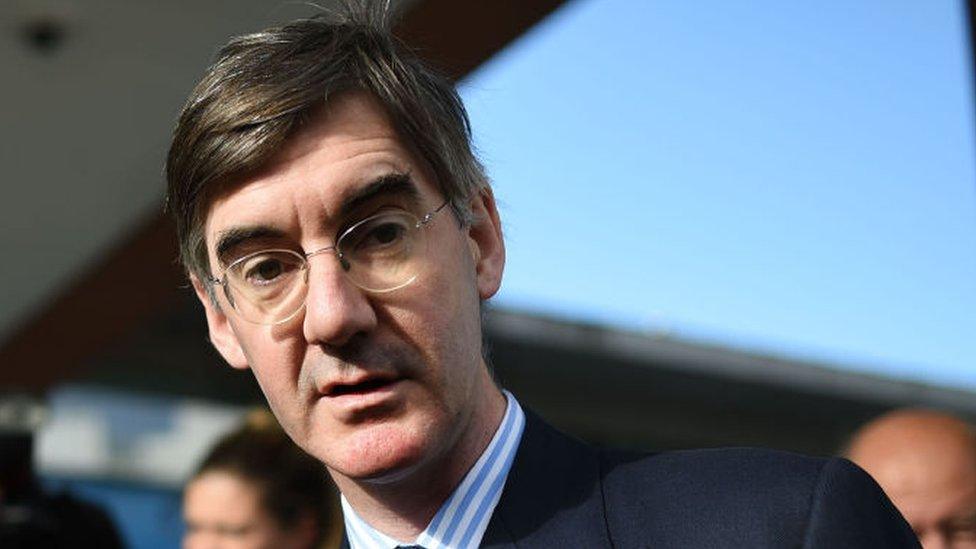Jacob Rees-Mogg says Treasury 'fiddling figures' on Brexit
- Published

Jacob Rees-Mogg chairs the Conservative Party's European Research Group
Prominent Brexiteer Jacob Rees-Mogg has accused Treasury officials of "fiddling the figures" on Brexit to keep the UK in the European Union customs union.
It comes amid claims, which the Treasury has denied, that it had deliberately created an economic model that made all other options look bad.
The FDA union, which represents civil servants, attacked the MP for peddling "unsubstantiated conspiracy theories".
The Treasury said it was working hard to deliver the best deal for Britain.
Conservative MP Mr Rees-Mogg told BBC Radio 4's Today programme: "If you look at the forecasts the Treasury made before the referendum, they were a humiliation.
"They were clearly politically influenced."
But FDA general secretary David Penman said the comments were "clear evidence" that the MP was "prepared to sacrifice anyone or anything on the altar of his own ideology".
He told the BBC Theresa May had to "get a grip on both her ministers - who are peddling these myths as well - and on Conservative politicians".
He said it should be the prime minister or Cabinet ministers defending the civil service - not him, and called for an end to "constant swiping at the messenger" which was undermining trust in the government and the civil service.
The Treasury said that both the prime minister and the chancellor have repeatedly stated the UK will be leaving the single market and the customs union and that "any suggestion to the contrary is simply false".
Mr Rees-Mogg said former chancellor George Osborne had set up the Office for Budget Responsibility, which provides independent analysis of the UK's public finances, because Treasury forecasts "had been politicised".
"And it was thought they were unreliable on political grounds," he added.
"With the referendum and with the EU, the Treasury has gone back to making forecasts.
"It was politically advantageous for them in the past. It is the same now.
"So yes, I do think they are fiddling the figures."

Analysis
By BBC political correspondent Matthew Cole
This is more than a row about a backbench MP challenging Treasury figures he doesn't like.
Jacob Rees-Mogg leads a section of MPs on whom Theresa May's future might depend.
That bloc - the Tories' European Research Group - are vehemently opposed to the UK staying in ANY form of customs union with the EU after Brexit.
This week, key ministerial meetings will take place on that very subject, with Theresa May known to be against staying in THE customs union, but open-minded to setting up a less expansive arrangement.
So Jacob Rees-Mogg's intervention could be taken as upping the ante, exerting extra pressure on Mrs May ahead of this big week, which could provide crucial answers to our future relations with the EU, and to the prime minister's future.

His comments came after Theresa May, on the final day of her official visit to China, appeared to suggest some sort of customs agreement with the EU could be possible - even though ministers have said Britain will leave the existing customs union.
Mr Rees-Mogg stated any such deal would be unacceptable to Tory Brexiteers as it would prevent the UK from striking free trade deals with other countries.
"We need to be free to do deals with the rest of the world," he said.
"We must be out of the protectionist common external tariff which mainly protects inefficient EU industries at the cost to British consumers."
Commons apology
It is the second time this week that Mr Rees-Mogg has condemned civil servants' economic forecast concerning the impact of Brexit.
The row began on Tuesday with a report leaked to Buzzfeed, external which said growth would be lower in each of three different Brexit outcomes than if the UK had stayed in the EU.
The government said its preferred option however - a bespoke deal covering trade and financial services - was not among those analysed in the leaked paper.
But in the Commons on Thursday, Mr Rees-Mogg asked Brexit minister Steve Baker to confirm whether he had heard that officials were deliberately trying to influence policy in favour of staying in the EU customs union.
He attributed the remarks to Charles Grant, the head of the Centre for European Reform.
On Friday, Mr Baker apologised to MPs for saying Mr Rees-Mogg's account of the remarks was "essentially correct".
Mr Grant had denied making them and an audio recording emerged where he did not say what was attributed to him.
However, Mr Rees-Mogg said he stood by his original claim.
Mr Grant told the BBC he was surprised that Mr Rees-Mogg had not apologised to him.
'Absolutely outrageous'
Lib Dem leader Sir Vince Cable called Mr Rees-Mogg's claims about the Treasury "absolutely outrageous".
"The government should be thinking about all possibilities and how to minimise the damage from Brexit," he said.
"Serious Conservatives inside and outside government are saying that whatever happens with Brexit, we should remain in a customs union.
"The Treasury would be failing in its duty if it didn't examine that possibility seriously; we should be inside a customs union whatever happens."